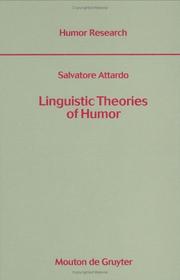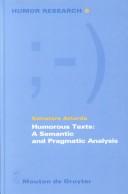| Listing 1 - 10 of 25 | << page >> |
Sort by
|
Book
ISBN: 9781412999090 Year: 2014 Publisher: Los Angeles (Calif.) Sage Reference
Abstract | Keywords | Export | Availability | Bookmark
 Loading...
Loading...Choose an application
- Reference Manager
- EndNote
- RefWorks (Direct export to RefWorks)
Book
ISBN: 9781138843066 9781315731162 9781317551164 9781317551157 9781317551140 1317551168 1315731169 1138843067 131755115X 1317551141 9781032402239 Year: 2017 Publisher: New York, N.Y. Routledge, Taylor & Francis Group
Abstract | Keywords | Export | Availability | Bookmark
 Loading...
Loading...Choose an application
- Reference Manager
- EndNote
- RefWorks (Direct export to RefWorks)
The Routledge Handbook of Language and Humor presents the first ever comprehensive, in-depth treatment of all the sub-fields of the linguistics of humor, broadly conceived as the intersection of the study of language and humor. The reader will find a thorough historical, terminological, and theoretical introduction to the field, as well as detailed treatments of the various approaches to language and humor. Deliberately comprehensive and wide-ranging, the handbook includes chapter-long treatments on the traditional topics covered by language and humor (e.g., teasing, laughter, irony, psycholinguistics, discourse analysis, the major linguistic theories of humor, translation) but also cutting-edge treatments of internet humor, cognitive linguistics, relevance theoretic, and corpus-assisted models of language and humor. Some chapters, such as the variationist sociolinguistcs, stylistics, and politeness are the first-ever syntheses of that particular subfield. Clusters of related chapters, such as conversation analysis, discourse analysis and corpus-assisted analysis allow multiple perspectives on complex trans-disciplinary phenomena. This handbook is an indispensable reference work for all researchers interested in the interplay of language and humor, within linguistics, broadly conceived, but also in neighboring disciplines such as literary studies, psychology, sociology, anthropology, etc. The authors are among the most distinguished scholars in their fields. Review: "The present Handbook testifies to Salvatore Attardo's lifetime involvement in the linguistic mechanisms of humor and its societal effects. The collection of articles he has gathered here represents at the same time a milestone, a compendium, and a beacon: as a milestone, it marks the advances obtained in humor studies up to and including our times; as a state-of-the-art compendium, it both reveals the `state' of the `art', and details its cutting edges; and as a beacon, it identifies skerries and dangerous currents, while at the same time shining light on the path ahead across the uncharted waters of future study. I highly recommend the work to anybody involved in humor studies: from the interested bystander to the advanced student to the accomplished researcher and teacher - and beyond." Jacob L. Mey, The University of Southern Denmark "This book will undoubtedly become the go-to book for scholars wanting updated summaries of linguistic concepts, tools and approaches to humour. Leading scholars review their fields in succinct and accessible chapters, introduced by Attardo. Topics range from key terms and theories of humour to neurolinguistics and the translation of humour, from corpus-assisted studies and humour markers to failed humour and humour of the internet. This is a truly invaluable collection." Jessica Milner Davis, University of Sydney.
Linguistics --- Stilistics --- Pragmatics --- Humor --- Wit and humor --- Language and languages --- taalkundige studies. --- Anecdotes --- Linguistic science --- Science of language --- Foreign languages --- Languages --- Ana --- Facetiae --- Bons mots --- Jests --- Jokes --- Ludicrous, The --- Ridiculous, The --- Wit and humor, Primitive --- E-books --- Literature --- Joking --- Laughter --- Anthropology --- Communication --- Ethnology --- Information theory --- Meaning (Psychology) --- Philology --- Biography --- Humour --- Linguistique --- Anecdotes. --- Humour. --- Linguistique. --- Taalkundige studies. --- Humor - Handbooks, manuals, etc. --- Wit and humor - Handbooks, manuals, etc. --- Language and languages - Handbooks, manuals, etc. --- Linguistics - Handbooks, manuals, etc.

ISBN: 3110142554 9786612714092 3110219026 1282714090 9783110142556 Year: 1994 Volume: 1 Publisher: Berlin ; New York : Mouton de Gruyter,
Abstract | Keywords | Export | Availability | Bookmark
 Loading...
Loading...Choose an application
- Reference Manager
- EndNote
- RefWorks (Direct export to RefWorks)
So this English professor comes into class and starts talking about the textual organization of jokes, the taxonomy of puns, the relations between the linguistic form and the content of humorous texts, and other past and current topics in language- based research into humor. At the end he stuffs all the various approaches to verbal humor into linguistic theory as a whole. Nobody gets it, see, so he tells them to buy the book.
Wit and humor --- Discourse analysis, Literary --- History and criticism --- Discourse analysis, Literary. --- History and criticism. --- Pragmatics --- Literary discourse analysis --- Rhetoric --- Literary style

ISBN: 3110887967 9783110887969 9783110170696 3110170698 311017068X 3110170698 9783110170689 Year: 2001 Publisher: Berlin Mouton de Gruyter
Abstract | Keywords | Export | Availability | Bookmark
 Loading...
Loading...Choose an application
- Reference Manager
- EndNote
- RefWorks (Direct export to RefWorks)
This book presents a theory of long humorous texts based on a revision and an upgrade of the General Theory of Verbal Humour (GTVH), a decade after its first proposal. The theory is informed by current research in psycholinguistics and cognitive science. It is predicated on the fact that there are humorous mechanisms in long texts that have no counterpart in jokes. The book includes a number of case studies, among them Oscar Wilde's Lord Arthur Savile's Crime and Allais' story Han Rybeck. A ground-breaking discussion of the quantitative distribution of humor in select texts is presented.
Discourse analysis, Narrative. --- Wit and humor --- Semantics. --- Pragmatics. --- Pragmalinguistics --- General semantics --- Language and languages --- Logic, Symbolic and mathematical --- Semantics (Philosophy) --- Formal semantics --- Semasiology --- Semiology (Semantics) --- Comparative linguistics --- Information theory --- Lexicology --- Meaning (Psychology) --- Narrative discourse analysis --- Narration (Rhetoric) --- History and criticism. --- Philosophy --- Discourse analysis, Narrative --- Pragmatics --- Semantics --- History and criticism --- Lexicology. Semantics
Book
ISBN: 1483364712 1483346188 178402581X 148334617X 9781483346175 9781483346182 9781483364711 9781412999090 141299909X 1483364704 Year: 2014 Publisher: Los Angeles : SAGE Reference,
Abstract | Keywords | Export | Availability | Bookmark
 Loading...
Loading...Choose an application
- Reference Manager
- EndNote
- RefWorks (Direct export to RefWorks)
This work explores the concept of humour in history and modern society in the United States and internationally. Its scope encompasses the humour of children, adults, and even nonhuman primates throughout the ages, from crude jokes and simple slapstick to sophisticated word play and ironic parody and satire. As an academic social history, it includes the perspectives of a wide range of disciplines, including sociology, child development, social psychology, life style history, communication, and entertainment media.
Laughter --- Wit and humor --- Bons mots --- Facetiae --- Humor --- Jests --- Jokes --- Ludicrous, The --- Ridiculous, The --- Wit and humor, Primitive --- Literature --- Joking --- Laughing --- Emotions --- Nonverbal communication --- Psychological aspects --- History --- History and criticism --- Laughter - Encyclopedias --- Wit and humor - Encyclopedias
Book
ISBN: 9780198791287 0198791283 9780198791270 0198791275 Year: 2020 Publisher: Oxford, United Kingdom Oxford University Press
Abstract | Keywords | Export | Availability | Bookmark
 Loading...
Loading...Choose an application
- Reference Manager
- EndNote
- RefWorks (Direct export to RefWorks)
This book is the first comprehensive and systematic introduction to the linguistics of humor. Salvatore Attardo takes a broad approach to the topic, exploring not only theoretical linguistic analyses, but also pragmatic and semantic aspects, conversation and discourse analysis, ethnomethodology, and interactionist and variationist sociolinguistics. The volume begins with chapters that introduce the terminology and conceptual and methodological apparatus, as well as outlining the major theories in the field and examining incongruity and resolution and the semiotics of humor. The second part of the book explores humor competence, with chapters that cover semantic and pragmatic topics, the General Theory of Verbal Humor, and puns and their interpretation. The third part provides an in-depth discussion of the applied linguistics of humor, and examines social context, discourse and conversation analysis, and sociolinguistic aspects. In the final part of the book, the discussion is extended beyond the central field of linguistics, with chapters discussing humor in literature, in translation, and in the classroom. 0The volume brings together the multiple strands of current knowledge about humor and linguistics, both theoretical and applied; it assumes no prior background in humor studies, and will be a valuable resource for students from advanced undergraduate level upwards, particularly those coming to linguistics from related disciplines.
Digital
Year: 2017 Publisher: Abingdon Routledge
Abstract | Keywords | Export | Availability | Bookmark
 Loading...
Loading...Choose an application
- Reference Manager
- EndNote
- RefWorks (Direct export to RefWorks)
Book
ISBN: 1839988568 9781839988561 9781839988585 Year: 2023 Publisher: London Anthem Press
Abstract | Keywords | Export | Availability | Bookmark
 Loading...
Loading...Choose an application
- Reference Manager
- EndNote
- RefWorks (Direct export to RefWorks)

ISBN: 9783110219029 3110219026 3110142554 9783110142556 1282714090 9781282714090 9786612714092 6612714093 Year: 1994 Publisher: Berlin Mouton de Gruyter
Abstract | Keywords | Export | Availability | Bookmark
 Loading...
Loading...Choose an application
- Reference Manager
- EndNote
- RefWorks (Direct export to RefWorks)
So this English professor comes into class and starts talking about the textual organization of jokes, the taxonomy of puns, the relations between the linguistic form and the content of humorous texts, and other past and current topics in language- based research into humor. At the end he stuffs all the various approaches to verbal humor into linguistic theory as a whole. Nobody gets it, see, so he tells them to buy the book.
Discourse analysis, Literary. --- Wit and humor --- History and criticism. --- Pragmatics --- Discourse analysis, Literary --- History and criticism
Book
ISBN: 1839988584 1839988576 Year: 2023 Publisher: London : Anthem Press,
Abstract | Keywords | Export | Availability | Bookmark
 Loading...
Loading...Choose an application
- Reference Manager
- EndNote
- RefWorks (Direct export to RefWorks)
The book shows how humor has changed since the advent of the internet: new genres, new contexts, and new audiences. The book provides a guide to such phenomena as memes, video parodies, photobombing, and cringe humor. Included are also in-depth discussions of the humor in phenomena such as Dogecoin, the joke currency, and the use of humor by the alt-right. It also shows how the cognitive mechanisms of humor remain unchanged. Written by a well-known specialist in humor studies, the book is engaging and readable, but also based on extensive scholarship.
Internet --- Wit and humor --- Internet --- Social aspects. --- History and criticism. --- Humor.
| Listing 1 - 10 of 25 | << page >> |
Sort by
|

 Search
Search Feedback
Feedback About UniCat
About UniCat  Help
Help News
News